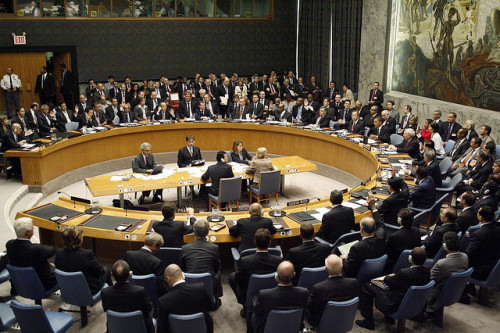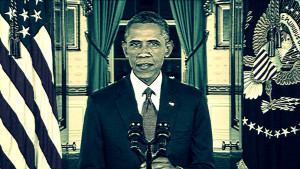
As I mentioned previously, I needed to make a more substantive reply to Victor Allen’s claims for R2P. I am very tardy in doing so, for which I apologize to Mr. Allen but better late than not at all. While addressing some of Victor’s specific points, I want to be very clear that in my view:
1. R2P’s status in international law, despite grandiose claims by advocates, is weakly grounded, highly controversial and conflicts with accepted norms of state sovereignty
2. The concept of R2P is a covert revival of the pre-WWI sovereign right to wage aggressive war, albeit (usually) under some kind of collective imprimatur
3, If regarded as a serious legal moral principle entailing an obligation to act, R2P is inherently anti-strategic, injurious to national interest and anti-democratic in nature
I will tackle point #1 today and points # 2 and #3 in successive posts.
In Victor’s original piece he argued that R2P is part and parcel of a (theoretical) “new sovereignty”:
That R2P does not violate sovereignty stems from the evolution of sovereignty from its Westphalian form in the mid 17th century to the “sovereignty as responsibility” concept advanced by Deng, et al. Modern sovereignty can no longer be held to give states carte blanche in their internal affairs regardless of the level of suffering going on within their borders. This does not diminish state agency for internal affairs, but rather holds them responsible and accountable for their action and inaction regarding the welfare of their populations.
“Sovereignty as responsibility” is a theory put forth by a Sudanese diplomat and minor UN bureaucrat and an American academic that proclaimed:
The authors assert that sovereignty can no longer be seen as a protection against interference, but as a charge of responsibility where the state is accountable to both domestic and external constituencies.
The “…and external constituencies” clause is an Orwellian negation of the traditional meaning of sovereignty where the state has sole de jure authority over such matters as their internal affairs, including the political character of their regime, with very narrow exceptions mandated by treaty or customary international law ( ex. diplomatic immunity of heads of state). The latter, is based on consent and derives from the history of the diplomatic norms adhered to, interpreted and practiced by sovereigns and such rulings of IGO to whose authority sovereigns have voluntarily submitted themselves through a binding covenant ( ex. World Court via the UN charter).
Of course, being sovereign, states differ on how such rulings are to be interpreted or even whether they will accept jurisdiction of bodies like the World Court, the ICC or special international tribunals of justice in specific cases. Furthermore, in signing covenants, states often, quite legally, make reservations or exceptions to specific treaty clauses as part of their agreement to adhere to the rest of the treaty and consider it legally binding. The United States in fact, does this regularly as do most other states having major interests at stake in negotiating an international agreement. Unless you have a granular knowledge of what country “x” formally agreed to accept as a signatory, or are willing to do your homework in this regard, you do not actually know what the law really is in many diplomatic disputes – especially when the conflict is complex and multilateral. Broad and bombastic assertions by activists in the media that novel restrictions or obligations on states that they support are “international law” or that some act they condemn is “illegal” are almost invariably factually incorrect, at least to some degree ( barring obvious and clear violations of jus cogens, such as mass atrocities).
Beyond international law based on formal covenants, custom and legal precedents generally accepted by sovereigns, other sources of authority in international law would include resolutions of the UN Security Council, the UN General Assembly, regional bodies like the OAS or EU, some institutions like the ICRC and even the opinions of scholars learned in international law. Unlike positive law within a state, international law in its various manifestations lacks a legitimate, overarching, coercive authority that could function as a global sovereign and impartial enforcer of consistently interpreted law and justice. Sovereign states are thus not subject to international law in the same relationship that their citizens are subject to sovereign authority; sovereign states are, at least legally, a community of equals able to draw upon and interpret overlapping and at times competing sources of legal authority in making claims – including precedents they intentionally created themselves! This makes a quick redress of violations of international law difficult when the UN Security Council is empowered to make use of military force only in cases of ” international peace and security” (i.e. aggression) and the UN Charter also assures sovereigns of their “right to self defense”.
“New Sovereignty”, in the title of Victor’s first piece, is a concept propagated by the late Harvard theorist and State Department official Abram Chayes and his wife, scholar Antonia Handler Chayes, that repudiates much of traditional sovereignty in order to aggressively re-define it as “ the capacity to participate in international institutions of all types“. In other words, sovereignty in their view would mean a state’s membership in good standing in a mutually interdependent ” international community” and not control over national territory free from external interference by other sovereigns. Under “New Sovereignty”, such external interference is assumed as “normal” and is a point of constant, cooperative, negotiation toward consensus on emerging and evolving legal norms. As such, if accepted, “New Sovereignty” would be a massive transfer of political power and legal authority from legitimate national governments to a transnational and international class of legal technocrats and bureaucrats, who would assume by default a managerial role over the substance of international affairs. In many ways this erosion of traditional state sovereignty would be analogous to the transfer of real power from the hands of crowned sovereigns in the early modern period to their embryonic state bureaucracies that in time rendered most monarchs mere ceremonial figureheads.
In my view, while Chayes had many laudable goals in mind, “New Sovereignty” would be unworkable in practice and inherently is extremely reactionary in its anti-democratic repudiation of popular sovereignty as the basis for a state’s legitimacy. Citizens of states are effectively reduced to the position of wards under the protection of the international community as national leaders become responsive primarily to “external constituencies” in control of the eternal process of negotiation of international norms. While the problem is somewhat moot for repressive regimes whose citizens enjoy few freedoms anyway, in liberal states the “democratic deficit” produced by such a scheme runs contrary to the very foundations of their political legitimacy and independence.
In this context, we have the claim put forth for the legal basis of R2P by Victor:
….Indeed, the UN Security Council, having enshrined R2P in UNSCR 1674, did not subsequently authorize action under the R2P banner in the aftermath of Cyclone Nargis in Burma, with the Special Adviser to the Secretary-General stating in his report that
[i]t would be a misapplication of responsibility to protect principles to apply them at this point to the unfolding tragedy in Myanmar…the Outcome Document of the 2005 [World] Summit limited their application to four crimes and violations: genocide, crimes against humanity, war crimes and ethnic cleansing.
and in his second post:
Here Safranski and I agree on the proper role of theorists, but it wasn’t theorists that adopted R2P as a norm; it was the UN Security Council, as set forth in UNSCR 1674 in 2005, which was later utilized in the Libya intervention authorization (UNSCR 1973). Currently there are no higher authorities on interventions, peacemaking, and peacekeeping than the Security Council, which is surely not composed of academic theorists, but rather high-level diplomats that make moves, and yes, establish law, only on the explicit authorization of their countries. That the Security Council adopted the principles of R2P speaks more to the usefulness and applicability of the concepts than to any academic theorizing thereof.
First, while we should acknowledge that the UNSC resolutions that R2P advocates crow about are not nothing, their importance should not be exaggerated either. They are a precedent, but a very limited one that does not abrogate everything that has come before.
Since the inception of the UN the Security Council has passed over 2200 resolutions, which would put those devoted to R2P at a whopping .0009 %. Moreover, of the UNSC resolutions passed, many merely take note of an event, express concern or urge restraint; other, more forcefully worded resolutions, dealing with conflict were dead letters from the moment of adoption, being ignored by warring parties exercising their sovereign rights of self-defense. The number of UNSC resolutions that led to effective action of any kind, much less decisive humanitarian military intervention envisioned by more muscular interpretations of R2P, have been few with a mixed track record of success. Resolutions 1674 and 1973 by the Security Council exist within the much larger context of international law precedents going back centuries, most of which directly contradict the operative assumptions of “New Sovereignty”.
Furthermore, much of the text of Resolution 1674 itself is devoted to caveats reiterating traditional sovereign prerogatives and that protection for civilians occur under established conventions for the law of armed conflict before gingerly endorsing R2P provisions from the 2005 World Summit Outcome Document of the World Health Organization. The legality of these qualifications and reservations are taken seriously by the member states of the Security Council because without them, 1674 would have never passed, nor 1973 after it ( likely to be the last of its kind for a long while in light of Russian and Chinese vetoes on Syria resolutions, which after Libya are certain to continue). At best, in international law R2P has managed to secure only a toehold and its definition and application lack agreement (and even acceptance) among the world’s great powers.
R2P is not a secure legal scaffold on which to construct a foreign policy or decide on matters of peace and war.






